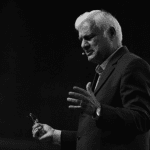I’m not convinced the Internet has been anything but a net loss. I truly mean that sentiment. The rather obvious truth is that the Internet has been used for much good. We have the world’s wealth of information at our fingertips. We have access to theologically orthodox and robust sermons, blogs, books, and the like, and we have near instant access to them. We are able to communicate with people around the world in an instant—making the physical limitations in such a feat immaterial.
In the same breath, it seems that having such a wealth of resources available to us has made us all the more ignorant rather than wiser. The intrinsic problem is not that good materials are lacking, but rather, much knowledge does not necessitate one be found wise in the eyes of God. An individual can be quite learned in many things—they can be an intellectual of the highest order—and yet have very little wisdom, even if they are in Christ. This is also why one can unabashedly say that the common tropes concerning wisdom are not necessarily always true.
Indeed, wisdom is not a trait necessarily inherited through much schooling, life experience, or even with many years. These things may produce wisdom in an individual, but they do not necessitate it. Simply consider the proverb of the fool who returns to his folly like a dog to his own vomit (Pro. 26:11). He is ever-experiencing the same folly all throughout his life. He never learns from it, and therefore, he remains a stiff-necked fool until the day he dies. He can experience the hardest of trials and sufferings as a result of his own sinful dull-headedness, yet his folly will not depart from him (Pro. 27:22). He will forever embody the stubborn spirit of a boorish man who despises correction (Pro. 12:1).
There are many days I wonder if the Internet has been anything but a revelatory tool into the heart of man, designed to show how misplaced our affections are. Perhaps more to the point: it causes me to consider how words are a window to the state of our soul. It is out of the abundance of the heart that a man speaks (Lk. 6:45). A foolish heart proclaims its folly to all (Pro. 12:23, 13:6), invites destruction (Pro. 10:14), spouts endless amounts of folly (Pro. 15:2), and delights only in airing its own opinions (Pro. 18:2).
It was Christ our Lord who said of our words, “…for every careless word that people speak, they will give an account of it on the day of judgment. For by your words you will be justified, and by your words you will be condemned” (Matt. 12:36-37). Likewise, the apostle James gave much attention to the double-mindedness of the loose-tongued, whose whole body is governed by their foolish words straight into eternal damnation (Ja. 1:19-27). He further echoes the wise king Solomon in highlighting the destruction wrought by those whose clucking tongues rule them (Ja. 3:2-12).
The point in all of this is not to suggest that a Christian’s foolish speech will revoke the salvation God has given, but rather, one’s speech will indeed validate one’s profession of faith in Christ. Again, words are a window to the state of our souls. Our words will either prove the reality of Christ’s work in us, or they will serve as a scathing indictment against us. For some, this indictment will reveal the true reality of their hearts, in that they have no love of Christ within them at all. Thusly, the malice, slander, revilement, etc., that all pour forth from their lips will simply prove the state of their heart, as one filled with all sorts of malice, slander, hatred, and more.
For many other professing Christians, I believe the indictment will not necessarily be one in which their faith is proven false, but one in which their life is considered a cautionary tale. To state that more clearly, I believe many can speak rather foolishly and still be considered a Christian. That should be a rather obvious and uncontroversial statement to make—but perhaps the more controversial follow up to this is that I believe many Christians today actually typify this type of behavior. If we are honest, we have all at one point or another embodied the position of the fool, especially as we are making our way through the book of Proverbs and the Spirit convicts us of areas of folly.
Yet as I look at much of the content Christians put out, the rationalizations many make to excuse pet sins, the ease with which the broader Evangelical church participates in what can only be construed as biting and devouring one another, and more, I find myself quite discouraged more often than not. Everyone has been gifted their own little soapbox from which they can air their grievances, and they do so quite happily, as if every day were a day to celebrate Festivus. The endless arguments, quibbling, and grand-standing is exhausting. The proclivity for many to say, “I am of Paul,” or “I am of Apollos,” is equally as exhausting.
My point is not to say theological differences are matters of indifference, but rather, there is a way Christians can conduct themselves in these things without mirroring the outrage culture our country is so fond of. We of all people should be able to candidly speak of our disagreements whilst maintaining brotherly love and affection toward one another. We of all people should be able to land firmly without resorting to character assassination, insinuation of motive, and blatant misrepresentation of one’s actual arguments. We of all people should be able to do these things—but we don’t.
The cheap, yet correct answer is that we are unable to do these things because of sin. Sin certainly is the root issue here, yet it is a specific sin we are guilty of in this. We are guilty of not being quick to listen, slow to speak, and slow to anger (Ja. 1:19). Perhaps there are a plethora of reasons as to why this is the case, but the one which I keep coming back to is that few really contemplate the connection between being quick to listen, slow to speak, and slow to anger. Fewer contemplate the reason for the statements James ushers. We are to be quick to listen, slow to speak, and slow to anger because the anger of man does not produce the righteousness of God (Ja. 1:20).
The remaining, immediate context of Jam. 1 provokes the reader to obedience in light of the fact that we all are to be quick to listen, slow to speak, and slow to anger. It then forms a bookend with v. 26 by saying, “If anyone thinks himself to be religious, yet does not bridle his tongue, but deceives his own heart, this person’s religion is worthless.” The point in all of that being: one who does not rid themselves of filthiness and wickedness, nor receive the word in humility, nor finds themselves a doer of the Word, but instead remains a mere hearer, has a worthless faith.
They may have a tremendous amount to say on the matter—they may even say many correct things—but if they are not found in obedience to those truths, they are the quintessential fool who looks into the mirror and immediately forgets his appearance. In other words, they have no authority to speak to much of anything of substance within the church simply because they can’t be obedient to some of the most basic components of the Christian faith. Most notably, they aren’t one who is characterized by self-control, but especially that of the tongue.
It is of no small coincidence that Paul instructs young Timothy by saying, “…a servant of the Lord must not be quarrelsome, but must be kind to everyone, able to teach, and forbearing. He must gently reprove those who oppose him, in the hope that God may grant them repentance leading to a knowledge of the truth. Then they will come to their senses and escape the snare of the devil, who has taken them captive to his will” (2 Tim. 2:24-26).
God has given the church teachers for her edification (1 Cor. 12:28; Eph. 4:11). A faithful pastor will run the full gambit of exhortation, rebuke, admonishment, correction, instruction, edification, and more. He will likewise be responsible for casting out the divisive person, the unrepentant, and the wolf—and yet at the same time, mending the wounds of those under his care. This, however, presents a rather interesting dilemma to those within the church who are hasty in speech. It posits at least three very important things:
- There is someone who is able to speak into matters of the faith—and that person is a biblically qualified elder. He will be an individual who embodies the qualities of the pastoral epistles, but especially in this context, he will be able to accurately handle the Scriptures. People within this elder’s local church have an obligation to listen to him, and this is on account of the authority vested in him by God.
- His position necessitates that he corrects those who oppose him, but that he does so gently and with hope that God will grant them repentance, which leads to a knowledge of the truth. By implication, this elder who is approved of God, will be in the position of correcting people regularly. In other words: he will be a man the average congregant finds disagreeable at several points.
- This in turn implies there will be many people who believe they hold a valid interpretation of Scripture that do not, who are in need of correction. Yet notice the passage goes into even more offensive territory. These people will need to come to repentance; they will need to be awakened to the fact that they are out of their senses and ensnared by Satan himself. To put that into the clearest of terms: James is saying to those of you who fancy yourselves teachers who are not, that you are trapped in the schemes of Satan—and that rather than argue endlessly with the one whom God has approved of and bears responsibility for your soul, you would do best to simply and humbly remain quiet.
The point in all of this is not to suggest the Christian shouldn’t test all things (1 Thess. 5:21), nor that they shouldn’t seek to be a Berean (Acts 17:11). Rather, it is to suggest that in one’s desires to be a diligent student of Scripture, they do not neglect the fact that our speech truly does reveal the state of our hearts. If anything, I believe the Internet, especially social media, will prove to be an invaluable tool that reflects that truth in a frighteningly clear way.













